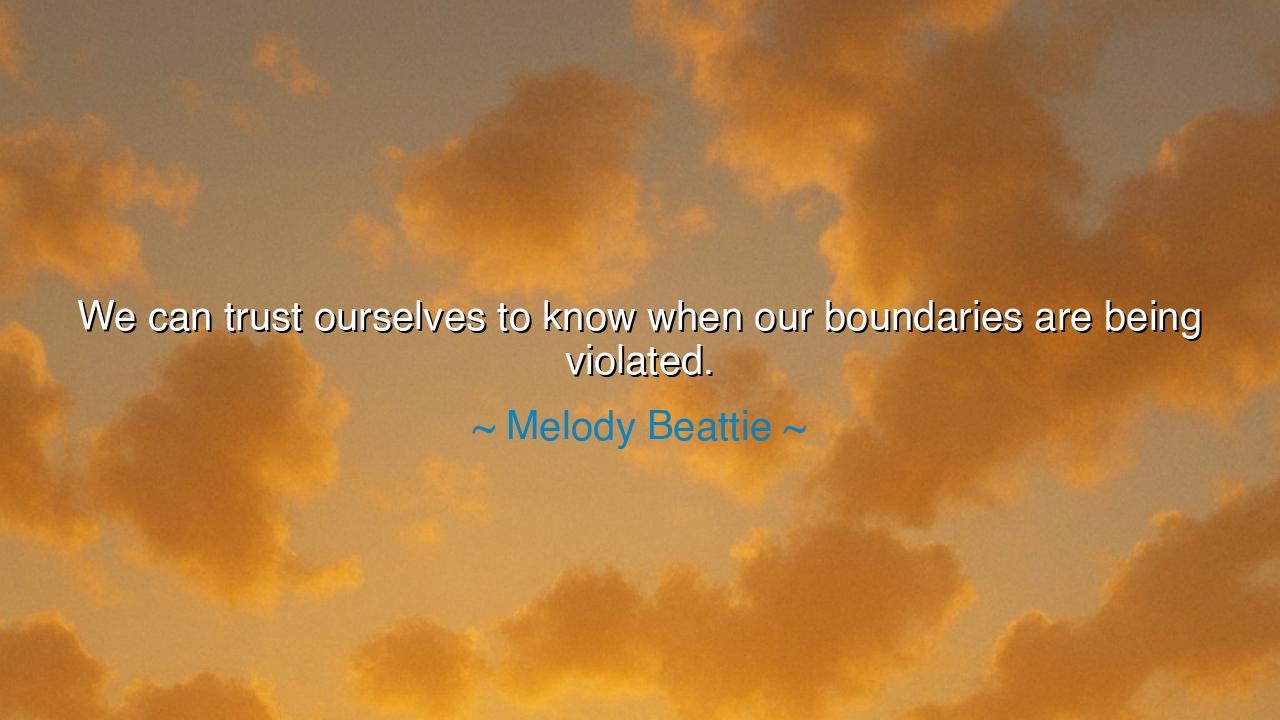
We can trust ourselves to know when our boundaries are being






Hear the gentle yet resolute wisdom of Melody Beattie: “We can trust ourselves to know when our boundaries are being violated.” These words are not shouted in the voice of conquest but spoken like a healing balm, born of experience and of suffering. For she, who has written of recovery, of codependency, and of the long road to healing, knows that the human spirit often doubts its own strength. Yet she calls us to remembrance: within each soul lies the power to discern when harm has crossed the sacred line of self.
The meaning of this saying is both practical and profound. So many of us are trained from childhood to ignore our own discomfort, to bow to others, to silence the voice within that cries out “enough.” Yet Beattie declares that the inner compass is trustworthy. We need not wait for another to tell us that we are being disrespected, diminished, or used. The body trembles, the heart aches, the spirit recoils—these are the sacred signals that our boundaries are being crossed. To listen to them is wisdom; to ignore them is to invite suffering.
The origin of this teaching lies in Beattie’s own work among those who struggled with codependency, people who lost themselves in caring for others while neglecting their own needs. She saw how often they doubted themselves, believing they had no right to say no, or no clarity to recognize when they were being harmed. Thus, her words became a reminder of empowerment: the truth is already within us. We do not need permission to defend our souls, nor do we require another’s judgment to know when a line has been crossed.
History too offers testimony to this truth. Consider the story of Rosa Parks, who one day refused to surrender her seat on a bus in Montgomery, Alabama. No law, no authority, no outside voice told her that her boundary was violated; she knew it in her heart. Her quiet defiance ignited a movement, for she trusted her own spirit’s cry that the line of dignity had been crossed. Thus, one woman’s refusal became the birth of justice for many.
And in another time, think of the Hebrew prophets, who stood before kings and rulers, declaring that the poor were being crushed and the innocent exploited. These men and women were not told by earthly powers that the people’s boundaries were violated; they felt it, they knew it, deep in the marrow of their being. Their trust in their inner compass gave them courage to speak truth to power, though it cost them dearly. In their witness, we see again Beattie’s wisdom: the soul knows when it is wronged, and to trust that knowing is the beginning of freedom.
The lesson for us is vital: do not silence the voice within you. When you feel uneasy, disrespected, or harmed, trust that sense. You may not yet have the words to name it, but your soul has already recognized it. To ignore this inner wisdom is to walk in chains; to trust it is to step into dignity. The world will always have those who try to convince you that your pain is an illusion, that your boundaries are unworthy. But your spirit knows better. Trust it.
Therefore, let us carry this truth into our daily lives: listen to your heart when it says “enough.” Guard your boundaries not with cruelty but with clarity. Speak when your dignity is trampled, withdraw when your peace is endangered, and trust that your inner wisdom is a compass pointing to freedom. For in the end, no one else can define where you begin and where you end. That truth rests within you—and to honor it is to honor life itself.






MNNguyen Mai Ngoc
I find this statement comforting because it gives power back to the individual. Still, I think trusting ourselves isn’t always easy in relationships that involve manipulation or gaslighting. When others challenge our perception of reality, it becomes difficult to know what’s a boundary violation and what’s just discomfort. How do we rebuild that trust in ourselves after it’s been eroded by years of self-doubt or control?
LANguyen lan Anh
There’s something beautifully simple yet profound in this perspective—it reminds us that we already have the inner tools to protect ourselves. But I wonder how this applies to people who grew up in environments where boundaries weren’t respected. Can we really trust instincts that were shaped by dysfunction or neglect? It feels like part of the journey is not just trusting ourselves, but relearning what safety even feels like.
BHPham Ngoc Bao Han
This idea feels empowering, but it makes me question how people distinguish between true intuition and emotional overreaction. Our minds can blur the line between self-protection and defensiveness. How can someone tell if they’re asserting healthy boundaries or just reacting out of fear or past trauma? I think Beattie’s statement invites deeper discussion about emotional intelligence and how self-trust develops alongside healing and self-awareness.
MXTruong my Xuyen
I like how this message emphasizes personal trust, but it also feels idealistic. Sometimes we don’t realize our boundaries are being crossed until long after the fact, especially in close relationships. Does that mean we failed to trust ourselves, or that boundaries can shift depending on context and emotional state? I think understanding boundaries is less about knowing instantly and more about learning through experience and reflection.
QCNguyẽn Tràn Qué Chi
This quote really makes me think about self-awareness and intuition. It’s empowering to believe that we can recognize when someone crosses our boundaries, but I wonder—what happens when we’ve been conditioned to ignore those instincts? Many people struggle to identify emotional or psychological violations because they’ve been taught to prioritize others. Maybe learning to trust ourselves isn’t natural—it’s something we have to practice and reclaim over time.